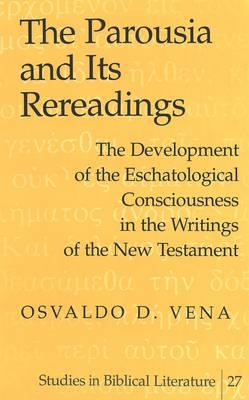Overview
One of the fundamental presuppositions of the theology of the Old Testament is the coming of God to establish the kingdom and to vindicate God's people, Israel. This metaphor receives ample and diverse treatment in the Hebrew Bible, ranging from beliefs in a temporal, earthly kingdom to a supra-temporal, heavenly kingdom. In the New Testament, this idea informs the early church's belief in a future coming of Christ at the end of the age to save and to judge and to usher in God's reign. This book attempts to analyze three different rereadings of this concept in the writings of the New Testament: the letters of Paul, the Gospel of Mark, and the second letter of Peter.
Full Product Details
Author: Osvaldo D. Vena
Publisher: Peter Lang Publishing Inc
Imprint: Peter Lang Publishing Inc
Volume: 27
Weight: 0.540kg
ISBN: 9780820449951
ISBN 10: 0820449954
Pages: 284
Publication Date: 08 October 2001
Audience:
Professional and scholarly
,
Professional & Vocational
Format: Hardback
Publisher's Status: Active
Availability: Available To Order

We have confirmation that this item is in stock with the supplier. It will be ordered in for you and dispatched immediately.
Reviews
Osvaldo Vena tackles a question that has both propelled and haunted New Testament scholarship since the end of the nineteenth century. Applying J. Severino Croatto's hermeneutic of rereading to interpreting the evolution of tradition, Vena offers a painstaking and eminently judicious examination of evolving conceptions of the Parousia in early Christianity. Vena situates each conception of the Parousia in its socio-historical (and community) context, arguing that futuristic expectations decrease as ecclesial institutionalism increases; at the same time, diminishing eschatological fervor reflects growing ecclesial accommodation to the wider society. Although each re-reading preserves something of the old, and a tension between realized and futuristic eschatology persists from one period to another, the transformation of earliest apocalyptic expectation during the first seventy years of the Christian movement suggests a trajectory from countercultural resistance toward cultural accommodation. Vena's important study carefully consolidates the gains of previous scholarship, injects fresh perspectives into the debate, and provides a highly readable and comprehensive discussion of early Christian eschatology. (Charles H. Cosgrove, Professor of New Testament Studies and Christian Ethics, Northern Baptist Theological Seminary) Osvaldo Vena's elaborate and carefully argued work contributes significantly to an understanding of the rich diversity encompassed by the phrase 'New Testament eschatological expectation'. He explores that diversity both with respect to its roots in the Hebrew Bible and in the cultures that surround the early Christian communities, and in the 're-readings' of those traditions in the various periods of New Testament history marked by concerns for 'transformation', 'mission', and 'consolidation'. Vena demonstrates conclusively the fallacy of seeking a single New Testament view of eschatology, like so many other issues of historical and theological concern to both academy and church. Thus, this careful exegetical and historical study provides a hermeneutical model as well for the scholarly community. (Sharon H. Ringe, Professor of New Testament, Wesley Theological Seminary)
Author Information
The Author: Osvaldo D. Vena is Associate Professor of New Testament Interpretation at Garrett-Evangelical Theological Seminary in Evanston, Illinois. He received his Th.D. from Superior Institute of Theological Education (ISEDET) in Buenos Aires, Argentina. Although this is his first book, he has published articles in both Spanish and English.




